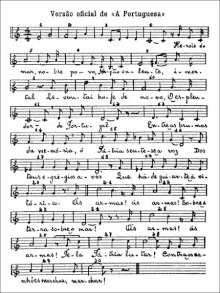"A Portuguesa"(" The Portuguese [song] ",Portuguese pronunciation:[ɐpuɾtuˈɣezɐ]) is the national anthem ofPortugal.The song was composed byAlfredo Keiland written byHenrique Lopes de Mendonçaduring the resurgentnationalistmovement ignited by the1890 British Ultimatumto Portugal concerning its African colonies. Used as themarching songof the failedrepublican revolt of 31 January 1891,inPorto,it was adopted as the national anthem of the newbornPortuguese Republicin 1911, replacing "Hino da Carta"(Hymn of the Charter), the anthem of the deposedconstitutional monarchy.[citation needed]
| English: The Portuguese | |
|---|---|
 Music and lyrics (1957) | |
National anthem ofPortugal | |
| Lyrics | Henrique Lopes de Mendonça,1890 |
| Music | Alfredo Keil,1890 |
| Adopted | 5 October 1910 |
| Audio sample | |
Official instrumental recording by the Orquestra da Presidência da República | |
History
editOn 11 January 1890, the United Kingdom issuedan ultimatumdemanding that Portugal refrain from colonizing land lying between the Portuguese colonies ofAngola,on the west coast of Africa, andMozambique,on the east coast, thereby forming one contiguous polity (as proposed on thePink Map). Despite a popular uproar, the Portuguese government accepted their demands. This contributed to the unpopularity of KingCarlos Iand the monarchy, and it garnered support for the increasingly popularrepublicanmovement in Portugal.[1]
The night after the ultimatum was accepted, composerAlfredo Keil,at the suggestion of a group of friends that includedRafael Bordalo PinheiroandTeófilo Braga,wrote the melody for "A Portuguesa" as a patriotic protest march. Inspired by the outrage felt by the Portuguese people, thelyricist,Henrique Lopes de Mendonça,accepted Keil's request to create words to suit his melody. Mendonça said "A Portuguesa" was a song "in which the fatherland's wounded soul would merge with its ambitions of freedom and revival"; he hoped it would be an anthem, embraced by the people, that could express their yearning for national vindication. Such expressions are epitomized by "La Marseillaise",the Portuguesefado,and "Hino da Maria da Fonte".[2]The march was quickly disseminated; several thousands of copies of the sheet music were freely distributed, together with fliers and posters. The song's popularity also spread across national borders, and verses were translated into other languages.[2]
On several stages inLisbon,"A Portuguesa" drew special attention. On 29 March 1890, the march was performed at the Great Patriotic Concert, held at theTeatro Nacional de São Carlos(Saint Charles National Theatre), as well as at every other theatre in the capital. Beyond its use in cultural displays, "A Portuguesa" was also exploited for commercial gain. Several food products, including canned sardines and cookies, were named for this song.[2]
However, the song was perceived as a political weapon, and it was soon converted into a republican hymn. This political co-option of the theme's original meaning forced both authors to disavow this vision and stress its purely non-partisan sentiments.[2]On 31 January 1891, arepublican rebellionbroke out in the northern city ofPortoand "A Portuguesa" was adopted by the rebels as their marching song. The rebellion was crushed, and the song was banned. However, it was never forgotten, and, on 5 October 1910, a new and strongerrebelliondeveloped as "A Portuguesa" played in the background. A year later, the first session of theConstituent Assemblyofficially proclaimed it as the national anthem.[1]
In 1956, the emergence of melodic variants of the anthem forced the government to create a committee whose aim was to define an official version. On 16 July 1957, the current version was proposed, and it was approved by theCouncil of Ministers.[1]
Lyrics
editThe anthem's official version consists of the firststanzaand thechorusfrom Mendonça's poem only.[3]
| Portuguese original | IPAtranscription[a] | English translation |
|---|---|---|
I |
1 |
I |
Protocol
editWithin Portugal, the anthem is played at both civilian and military ceremonies where the country, flag, or head of state (thePresident of the Republic) is honoured. It is also played at receptions for foreign heads of state, following that of the visitor, and in ceremonies during official presidential visits to other countries.[1]
Notes
editReferences
edit- ^abcd"Antecedentes históricos do Hino Nacional"(in Portuguese). Governo da República Portuguesa.Retrieved2009-07-31.
- ^abcd"Hino Nacional".Simbolos Nacionais(in Portuguese). Museu da Presidência da República. Archived fromthe originalon 2009-02-24.Retrieved2008-10-02.
- ^"Hino Nacional".Presidência da República Portuguesa(in Portuguese). Archived fromthe originalon 2020-11-11.Retrieved2020-09-21.
External links
edit- Sung audio
- National Anthemfrom the President of Portugal
- Hino Nacionalby Museum of the Presidency of the Republic(in Portuguese)
- Daily end of transmissiononYouTube,byRTP1,1980
